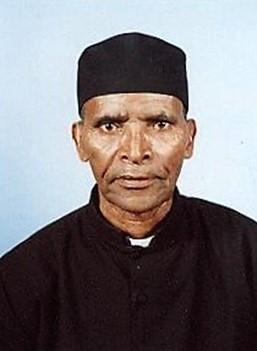Daniel Comboni
Comboni Missionaries
Institutional area
Other links
Newsletter
In Pace Christi
Seyum Cahsay Hagos
Fr. Seyum was born on 23 February 1927, the national Marian solemnity of Kidane Meheret, in Awo, near Alitena, in the diocese of Adigrat, to a profoundly Catholic family. He came to know the Comboni Missionaries in Asmara seminary where they were teaching. Fr. Pio Ferrari received a letter from the young seminarian who wanted to become “a Son of the Sacred Heart” like him. The understanding was that Seyum would have been admitted to the Institute after he completed his philosophical and theological studies in Asmara and Adigrat and after his priestly ordination (2 June 1963), with the blessing of his Bishop who finally, though reluctantly, gave his consent.
Fr. Seyum helped Fr. Emilio Ceccarini, Fr. Pietro Moro and Fr. Aristide Guerra to found a Comboni seminary at Decamerè (now in Eritrea) and only in 1965 did he enter the Comboni novitiate in Florence where, on 9 September 1967, he made his first religious profession. In Florence, he witnessed the floods (4 November 1966) that swept through the city and how many suffering people were left homeless, an element that seemed to repeat itself in almost all the places to which he was assigned: Gondar, Decamere Seminary (where he was based during the 14 worst years of the war) and in Addis Ababa.
Fr. Seyum was a formator and spiritual director in the seminaries. He was severe most of all with himself and he was greatly appreciated by those who are now priests in various parishes and missions, or bishops like Mons. Menghesteab Tesfamariam.
In his priestly ministry he was constant, generous and prudent: early in the morning he would go to various churches or convents, often in the cold and wet, walking long distances and sometimes being ridiculed by people in minibuses or on the road, who recognised him as a Catholic priest.
The service he could offer the Church was for him a priority and this led him to embark on the task of translating into Amharic an almost complete volume of the documents of Vatican II, the Catechism of the Catholic Church and the Code of Canon Law of the Oriental Churches.
He had an accident in 2011: his foot was crushed by a minibus against a kerbstone and, unfortunately, Fr Seyum could no longer walk long distances and had to agree to be assigned to the Provincial House on 1 August 2012.
He had a second accident, a fall, on 12 July 2020, which left him bedridden for the rest of his life, in continual pain. When he was discharged from the hospital, he was happy to return home to his confreres where he was lovingly assisted by some nurses but he soon had to come to terms with a general weakness which caused some damage to his memory and coordination.
During the final days of his life, perhaps unconsciously, he refused all food or drink. He prepared for the call of the redeemer which came on the national Marian solemnity of the Dormition, Friday 29 January 2021, at 16.50.
The funeral Mass was celebrated at the provincial house and presided by Cardinal Berhaneyesus with more than 20 concelebrants from various parishes and congregations. There were also many Sisters and lay people, among whom were some relatives of Fr. Seyum. He was buried in the cemetery of Saints Peter and Paul in Addis Ababa
In his homily, Fr. Sisto Agostini, the provincial superior, asked Fr. Seyum, as the “grandfather” of the young Ethiopian Combonis, to pray for the gift of new vocations for the Institute, and for Ethiopia as well as for a dignified life for mothers, children, the elderly and the very young.
Many testimonies were received among which was that of Mons. Menghesteab Tesfamariam, the Metropolitan Archbishop of Asmara who said, among other things: “For me, Fr. Seyum was an exemplary priest who had a spirit of poverty and humility. I especially admired his honesty and frankness”.
In his long message, Fr. Tesfaye Tadesse, Superior General, thanked Fr. Seyum for his life of faith, his spirit of research and the vast knowledge he had of history, geography, archaeology, agriculture and botany as well as for his great service of translation, translating and revising already translated texts and for his profound sense of communion, especially with those who suffer.
(Fr. Sisto Agostini).

